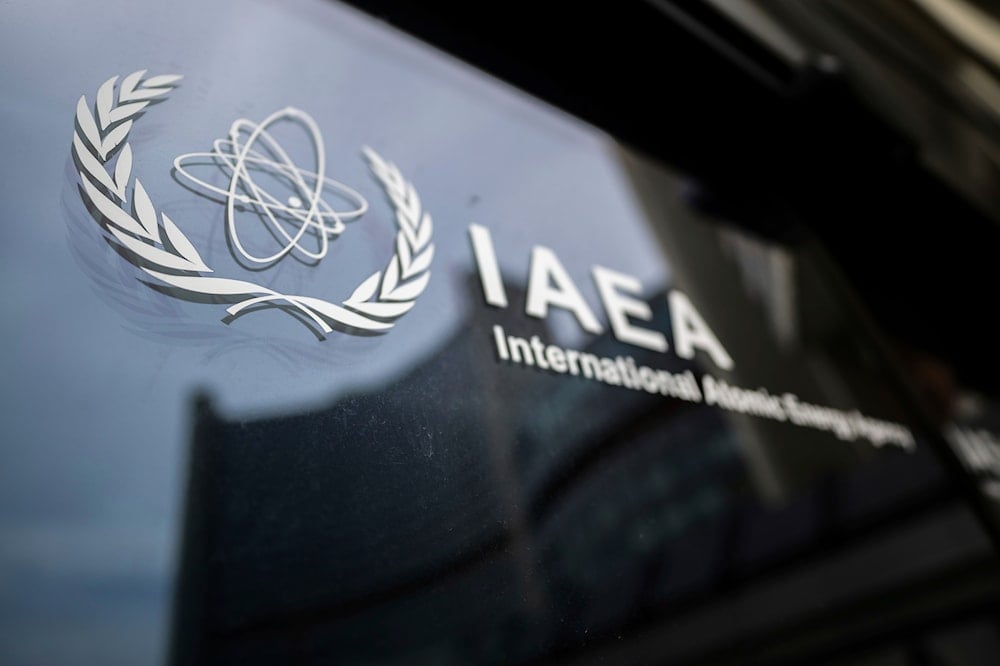Iran accuses IAEA inspectors of smuggling spy devices in shoes
Iran denounces the IAEA for acting as a Western tool, with lawmakers accusing inspectors of espionage and leaking sensitive nuclear data to hostile governments.
-

The International Atomic Energy Agency (IAEA) in Vienna, Austria, on June 23, 2025. (AP Photo/Michael Gruber)
A senior Iranian lawmaker accused inspectors from the International Atomic Energy Agency (IAEA) of engaging in espionage activities during visits to the country’s nuclear facilities.
Mahmoud Nabavian, deputy chairman of Iran’s National Security and Foreign Policy Committee, revealed on Saturday that agency personnel smuggled surveillance microchips into sensitive sites by concealing them in their shoes.
"Why is it that every time these inspectors enter our nuclear facilities, and we conduct body checks, we find microchips in their shoes?" Nabavian said, as reported by Fars News Agency.
He stressed that such incidents were not isolated, portraying the agency as a conduit for intelligence gathering. “It is a fact, not a slogan, that these inspectors are spies,” he asserted.
Accusations extend to IAEA director Rafael Grossi
Nabavian went further, saying that IAEA Director General Rafael Grossi has played a direct role in sharing classified nuclear information with Western states, emphasizing that "Even now, they themselves admit all our main statistics and information are given to them by Mr. Grossi."
The lawmaker questioned how facilities like the Natanz nuclear site became widely known, attributing it to leaks facilitated through a combination of satellite surveillance, espionage, and agency disclosure.
"They know because they are told by their satellites, their spies, and the agency itself," he added.
In recent weeks, tensions between Tehran and the UN nuclear watchdog have intensified, while in late June, Iran’s parliament passed legislation to suspend cooperation with the agency.
The move came just one day after a ceasefire was reached with "Israel," following nearly two weeks of Israeli aggression targeting Iranian territory.
Parliamentarians accused the IAEA of issuing "false reports" and exhibiting "politically biased behavior," which they say enables foreign intelligence operations against Iran’s nuclear infrastructure.
Iran's cooperation with IAEA has not ceased, taken new form: Araghchi
On another note, Iranian Foreign Minister Abbas Araghchi stressed on Saturday that Iran's cooperation with the International Atomic Energy Agency has not stopped, but has rather taken a new form. He warned Europe that its insistence on the snapback mechanism would end its role in Iran's nuclear file.
Addressing ambassadors, chargés-d'affaires, and heads of foreign missions during a meeting at the Foreign Ministry's compound in Tehran on Saturday, Araghchi expressed Iran's gratitude toward the nations that denounced "Israel's" recent act of aggression, emphasizing that approximately 120 countries condemned the offensive actions carried out by the Zionist regime and the United States against Iran.
Asserting that Iran has remained a compliant member of the NPT while maintaining its collaboration with the Agency, Araghchi asserted, "Our cooperation with the Agency has not stopped, it has just got a new form. From now on, relations with the Agency will be managed through the Supreme National Security Council (SNSC)."
He emphasized that "the Agency's request to continue cooperation with Iran will be reviewed on a case-by-case basis by the SNSC, and decisions will be made taking into account safety and security," the top diplomat explained.
"Security and safety are a matter of concern for inspectors approaching attacked nuclear facilities," Araghchi clarified.
Reviewing details of possible talks
Furthermore, he clarified that Iran was reviewing the details of a possible resumption of talks with the United States on its nuclear program.
"We are examining its timing, its location, its form, its ingredients, the assurances it requires" from Iran for possible talks, said Iran's lead negotiator.
He also reminded the attendees how Iran's nuclear facilities had come under attack, emphasizing that their current proximity raises serious hazards such as potential radioactive contamination or explosions, stressing that the safety and security risks must be a key consideration for inspectors when accessing these sites.
"There is no other way but to return to diplomacy and a negotiated and agreed solution, and the recent war proved this even more than before," the Iranian foreign minister stated, noting however, that "before that, the other side must reassure us that they want diplomacy, not that diplomacy is a cover to achieve their objectives."

 4 Min Read
4 Min Read










